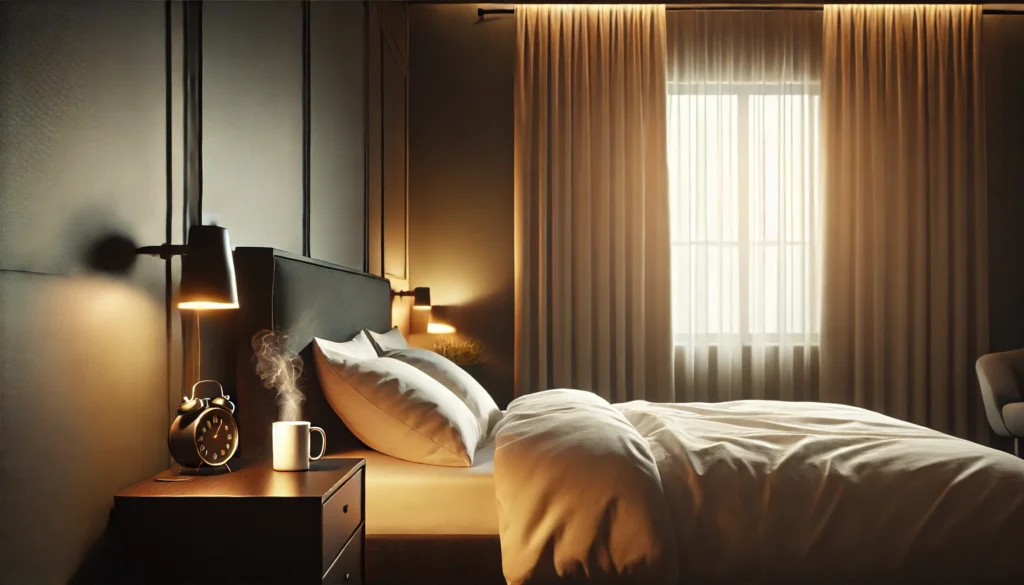In today’s fast-paced world, the value of a good night’s sleep cannot be overstated. More and more people are recognizing the importance of sleep for maintaining both physical and mental health. But what if the key to better sleep quality lies not just in the duration, but also in the timing? Specifically, can going to bed at 8 PM make a significant difference?
You May Also Like: Sleep Hygiene: Key Practices for Health
The Science Behind Sleep Timing
Understanding the science of sleep involves delving into our body’s circadian rhythms—our internal clock that regulates sleep and wakefulness over a 24-hour period. The circadian rhythm is influenced by environmental cues like light and temperature, aligning our sleep-wake cycle with the natural day-night cycle.
Circadian Rhythms Explained
Circadian rhythms are natural, internal processes that regulate the sleep-wake cycle and repeat roughly every 24 hours. These rhythms are influenced by external factors such as sunlight and temperature, helping to synchronize our biological clock with the environment. A well-aligned circadian rhythm ensures that our bodies perform essential functions, including hormone production and cell regeneration, at optimal times.
The Impact of Disrupted Circadian Rhythms
When circadian rhythms are disrupted, it can lead to a host of health problems. Irregular sleep patterns can cause sleep disorders, mood disturbances, and even metabolic issues. Factors like shift work, travel across time zones, and late-night screen exposure can throw off these rhythms, affecting sleep quality and overall health.
The Role of Melatonin
Melatonin, often dubbed the “sleep hormone,” plays a pivotal role in this cycle. As evening approaches and light exposure decreases, the pineal gland in the brain begins to secrete melatonin, signaling to the body that it’s time to wind down. By going to bed at 8 PM, you’re essentially aligning with your body’s natural rhythm, potentially enhancing sleep quality.

Historical Context: Early to Bed, Early to Rise
Historically, humans have adhered to a more natural sleep schedule. Before the advent of electricity, people typically went to bed shortly after sunset and rose with the sun. This practice was not merely a result of limited lighting options but a natural alignment with the circadian rhythm.
Evolution of Human Sleep Patterns
In ancient times, human sleep patterns were closely tied to the natural environment. People relied on the sun to dictate their daily activities, leading to consistent sleep schedules. This regularity fostered a balance that supported both physical and mental health, unlike today’s flexible schedules.
The Industrial Revolution’s Influence
The Industrial Revolution marked a significant shift in sleep patterns. With the introduction of artificial lighting and longer working hours, people began to sleep less and at irregular times. This period of innovation and economic growth brought about a culture of productivity that often sacrificed sleep in favor of longer working hours.
Modern Disruptions
In our modern society, artificial lighting and electronic devices have disrupted these natural sleep patterns, leading to a prevalence of late bedtimes. This shift has sparked a debate: is going to bed too early, such as 8 PM, beneficial, or is it merely an antiquated notion?
Current Trends and Research
Recent studies have shown that those who adopt an earlier bedtime tend to experience improved sleep quality. Research published in the journal “Sleep” indicates that aligning sleep schedules with natural circadian rhythms can enhance both the quality and quantity of sleep, leading to better overall health outcomes.
The Benefits of an 8 PM Bedtime
1. Enhanced Sleep Quality: By going to bed at 8 PM, you allow your body to enter the sleep cycle during its optimal window, potentially leading to deeper, more restorative sleep stages.Entering sleep during the body’s natural window maximizes the benefits of each sleep stage. Deep sleep, which is crucial for physical restoration, and REM sleep, important for memory consolidation, can occur more effectively when aligned with natural rhythms. This alignment may result in waking up feeling more refreshed and alert.
2. Improved Mental Health: Adequate sleep is closely linked to mental health. Early bedtimes can reduce stress and enhance mood stability, providing a more solid foundation for mental well-being.
Sleep is a critical component of mental health, impacting mood regulation and stress resilience. By synchronizing sleep with circadian rhythms, individuals may experience reduced symptoms of anxiety and depression. An early bedtime can lead to a more consistent sleep schedule, which is essential for mental health stability.
3. Increased Productivity: Waking up earlier can lead to improved focus and productivity, as it aligns with periods of heightened alertness during the day.
Early risers often find that their cognitive functions peak in the morning, making it an ideal time for tackling complex tasks. By aligning sleep with natural alertness phases, individuals can optimize their workday, leading to greater efficiency and less reliance on stimulants like caffeine.
Supporting Research Findings
Studies have highlighted the correlation between early bedtimes and improved health outcomes. Research suggests that individuals who sleep in harmony with their circadian rhythms are less likely to suffer from chronic conditions such as heart disease, obesity, and diabetes. These findings support the notion that sleep timing is as crucial as sleep duration.

Practical Advice for Transitioning to an Early Bedtime
For those considering a transition to an 8 PM bedtime, gradual adjustments are recommended. Sudden changes can be jarring and counterproductive. Here are some tips to ease the transition:
Establishing a Routine
1. Wind Down Gradually: Begin winding down an hour before your intended bedtime. This can include activities like reading, meditation, or taking a warm bath to signal to your body that it’s time to relax.
A consistent pre-sleep routine helps signal to your body that it’s time to relax and prepare for rest. Engaging in calming activities can reduce stress and anxiety, making it easier to fall asleep. Establishing this routine can enhance the body’s natural sleep signals.
2. Limit Screen Time: Exposure to blue light from screens can interfere with melatonin production. Aim to turn off electronic devices at least an hour before bedtime.
Blue light from devices like phones and computers can delay melatonin production, making it harder to fall asleep. Reducing screen time before bed can help align your sleep-wake cycle with natural rhythms. Consider using blue light filters or apps to mitigate its effects if you must use screens.
3. Create a Sleep-Conducive Environment: Ensure your bedroom is cool, dark, and quiet. Consider blackout curtains and white noise machines to enhance your sleep environment.
A comfortable sleep environment is essential for quality rest. The ideal sleep setting minimizes disruptions and supports the body’s natural cooling process during sleep. Enhancing your sleep environment can lead to more restful and uninterrupted sleep.
Gradual Adjustment Tips
Transitioning to an earlier bedtime doesn’t happen overnight. Start by adjusting your bedtime by 15-30 minutes each week until you reach your desired time. Consistency is key, so aim to maintain your new schedule even on weekends. Small, incremental changes are more sustainable and less likely to disrupt your current sleep patterns.
Addressing Sleep Challenges
Some individuals may experience initial difficulties when transitioning to an earlier bedtime. It’s important to be patient and persistent. If sleep disruptions persist, consider consulting a sleep specialist or healthcare provider for guidance. They can offer personalized strategies and address any underlying sleep disorders.
Addressing Common Concerns
Is Going to Bed at 8 PM Too Early?
A common concern is whether an 8 PM bedtime might be excessively early, leading to waking up in the middle of the night or experiencing fragmented sleep. While this can happen initially, the body often adjusts to the new schedule, resulting in a more consistent sleep pattern over time.
Adapting to a new sleep schedule takes time, and initial disruptions are common. Over time, the body can adapt to a new rhythm, leading to improved sleep quality. Monitoring your sleep patterns and making adjustments as needed can help achieve a stable routine.
How Early is Too Early?
Determining how early is too early varies from person to person, depending on individual sleep needs and lifestyle. The key is to listen to your body and adjust accordingly. Some may find that 9 PM works better, while others thrive with an even earlier bedtime.
Individual sleep needs vary, and what works for one person may not work for another. Experiment with different bedtimes and pay attention to how your body responds. The goal is to find a schedule that leaves you feeling refreshed and ready to tackle the day.
Balancing Social and Professional Life
One challenge of an early bedtime is balancing social and professional commitments. It’s crucial to communicate your sleep goals with family and friends to gain support. Consider scheduling social activities earlier in the evening and prioritizing essential commitments. Flexibility and planning can help maintain a healthy work-life-sleep balance.

Future Implications and Biohacking
As interest in optimizing sleep continues to grow, the concept of biohacking—using scientific research and technology to enhance human performance—becomes increasingly relevant. Biohackers often experiment with sleep patterns to maximize cognitive and physical performance.
Innovative Approaches
1. Nootropics and Supplements: Some individuals use nootropic supplements to enhance sleep quality and cognitive function. It’s essential to approach these with caution and consult healthcare professionals before use.
Nootropics and supplements can offer potential benefits for sleep enhancement, but they also carry risks. It’s vital to research and select reputable products while consulting with healthcare providers to ensure safety. Understanding the interaction between supplements and individual health conditions is crucial.
2. Sleep Technology: Advances in sleep technology, such as smart mattresses and sleep tracking devices, offer insights into sleep patterns and provide data-driven recommendations for improvement.
Sleep technology can provide valuable insights into your sleep habits and help identify areas for improvement. Devices that track sleep stages, heart rate, and movement can guide adjustments for better sleep quality. However, it’s important to use this data as a tool rather than a strict rule.
3. Personalized Sleep Strategies
Biohackers explore personalized approaches to optimize sleep, considering factors like genetics and lifestyle. Tailoring sleep strategies to individual needs can lead to more effective outcomes. Understanding one’s unique sleep profile can enhance the alignment of sleep patterns with natural rhythms.
Conclusion
While the idea of an 8 PM bedtime might seem unconventional in the modern world, evidence suggests it can significantly improve sleep quality by aligning with our natural circadian rhythms. Whether you’re a health coach, science journalist, or biohacker, understanding the interplay between sleep timing and quality can enhance your approach to health and wellness.
Ultimately, the best sleep schedule is one that fits your lifestyle while supporting optimal health. Listening to your body and making gradual adjustments can lead to a more restful night’s sleep and better overall well-being. Embracing the potential benefits of an early bedtime can be a transformative step toward enhancing sleep quality and overall health.
Further Reading:
Verywell Health: What Time Should You Go to Bed?
Cleveland Clinic: Falling Asleep Too Early? It Could Be Advanced Sleep Phase Disorder
The Guardian: Is going to bed at 9pm the secret to happiness? My week of sleeping like a gen Zer
Important Note: The information contained in this article is for general informational purposes only, and should not be construed as health or medical advice, nor is it intended to diagnose, prevent, treat, or cure any disease or health condition. Before embarking on any diet, fitness regimen, or program of nutritional supplementation, it is advisable to consult your healthcare professional in order to determine its safety and probable efficacy in terms of your individual state of health.
Regarding Nutritional Supplements Or Other Non-Prescription Health Products: If any nutritional supplements or other non-prescription health products are mentioned in the foregoing article, any claims or statements made about them have not been evaluated by the U.S. Food and Drug Administration, and such nutritional supplements or other health products are not intended to diagnose, treat, cure, or prevent any disease.


